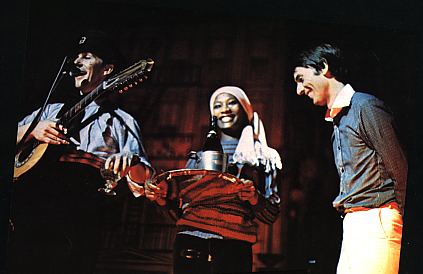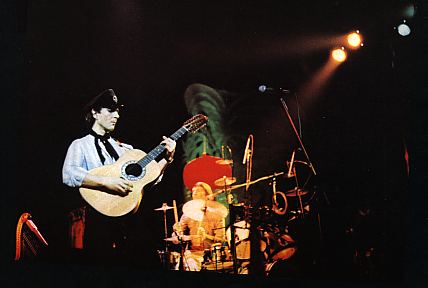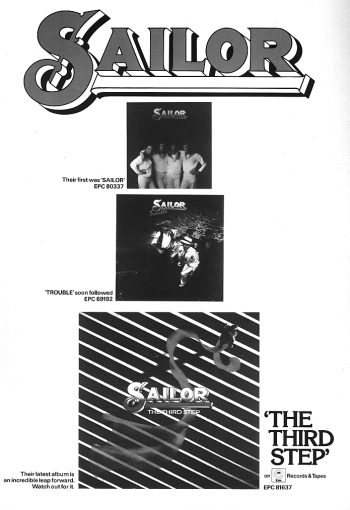
The Third Step Tour programme 1976

The Third Step Tour
programme
1976
Special thanks to Jon Hoskin (UK) for the "The Third Step" tour programme!
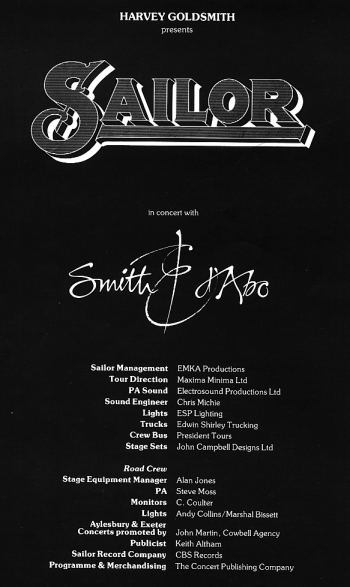
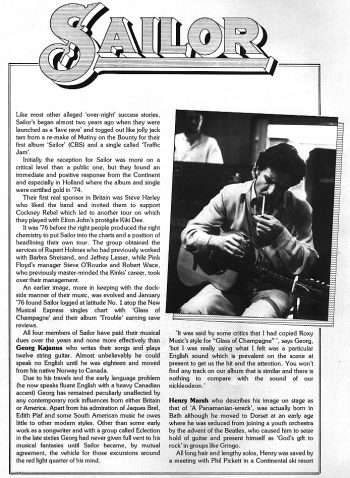
Like most other
alleged 'over night' success stories, Sailor's began almost two
years ago when they launched as a 'fave rave' and togged out like
jolly jack tars from a re-make of Munity on the Bounty for their
first album "Sailor" (CBS) and a single called
"Traffic Jam".
Initially the reception for Sailor wasmore on a critical level
than a public one, but they found an immediate and positive
response from the Continent and especially in Holland where the
album and single were certified gold in '74.
Their first real sponsor in Britain was steve Harley who liked
the band and invited them to support Cockney Rebel which led to
another tour on which they played with Elton John's protégée
Kiki Dee.
It was '76 before the right people produced the right chemistry
to put Sailor into the charts and a position of headlining their
own tour. The group obtained the service of Rupert Holmes who had
previously worked with Barbera Streisand, and Jeffrey Lesser,
while Pink Floyd's manager Steve O'Rourke and Robert Wace, who
previously master-minded the Kinks' career, took over their
management.
An earlier image, more in keeping with the dockside manner of
their music, was evolved and January '76 found Sailor logged at
lattitude No. 1 atop the Musical Express single chart with
"A Glass Of Champagne" and their album
"Trouble" earning rave reviews.
All four members of Sailor have paid their musical dues over the
years and none more effectively than
Georg Kajanus
who writes their songs and plays twelve string guitar.
Almost unbelievably he could speak no English until he
was eighteen and moved from his native Norway to Canada.
Due to his travels and the early language problem (he now speaks
fluent English with a heavy Canadian accent) Georg has remained
perculiarly unaffected by any contemporary rock influences from
either Britain or America. Apart from his admiration of Jaques
Brel, Edith Piaf and some South American music he owes little to
other modern styles. Other than some early work as a songwriter
and with a group called Eclection in the late sixties Georg had
never given full vent to his musical fantasies until Sailor
became, by mutual agreement, the vehicle for those excursions
around the red light quater of his mind.
"It was said by some critics that I had copied Roxy Music's
style for 'A Glass Of Champagne', says Georg, 'but I was really
using what I felt was in particular English sound which is
prevalent on the scene at present to get us the hit and the
attention. You won't find any track on our album that is similar
and there is nothing to compare with the sound of our
Nickelodeon.'
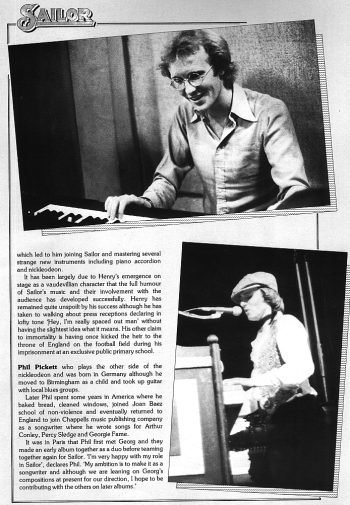
Henry Marsh
who describes his image on stage as that of "A
Panamanian-wreck", was actually born in Bath although he
moved to Dorset at an early age where he was seduced from joining
a youth orchestra by the advent of the Beatles who caused him to
seize hold of a guitar and present himself as 'God's gift to
rock' in groups like Gringo.
All long hair and lengthy solos, Henry was saved by a meeting
with Phil Pickett in a Continental ski resort which led him
joining Sailor and mastering several strange new instruments
including piano accordion and Nickelodeon.
It has been largely due to Henry's emerge on stage as a
vaudevillian character that the full humour of Sailor's music and
their involvement with the audience has developed successfully.
Henry has remained quite unspoilt by his success although he has
taken to walking about press receptions declaring in lofty tone
'Hey, I'm really spaced out man' without having the slightest
idea what it means. His other claim to immortality is having once
kicked the heir to the throne of England on the football field
during his imprisonment at an exclusive public primary school.
Phil Pickett
who plays the other side of the Nickelodeon and was born
in Germany although moved to Birmingham as a child and took up
guitar with local blues groups.
Later Phil spent some years in America where he baked bread,
cleaned windows, joined Joan Baez school of non-violence and
eventually returned to England to join Chappells music publishing
company as a songwriter where he wrote songs for Arthur Conley,
Percy Sledge and Georgie Fame.
It was in Paris that Phil first met Georg and made an early album
together as a duo before teaming together again for Sailor. 'I'm
very happy with my role in Sailor', declares Phil. 'My ambition
is to make it as a songwriter and although we are leaning on
Georg's compositions at present for our direction, I hope to be
contributing with the others on later albums.'
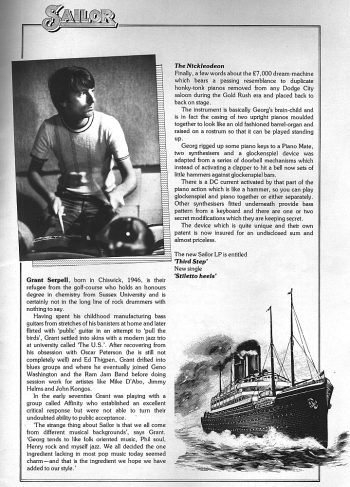
Grant Serpell,
born in Chiswick, 1946, is their refugee from the
golf-course who holds an honours degree in chemistry from Sussex
University and is certainly not in the long line of rock drummers
with nothing to say.
Having spent his childhood manufacturing bass guitars from
stretches of his banister at home and later flirted with 'public'
guitar in attempt to 'pull the birds', Grant settled into skins
with a modern jazz trio at university called "The
U.S.". After recovering from his obsession with Oscar
Peterson (he is still not completely well) and Ed Thigpen, Grant
drifted into blues groups and where he eventually joined Geno
Washington and the Ram Jam Band before doing session work for
artists like Mike D'Abo, Jimmy Helms and John Kongos.
In the early seventies Grant was playing with a group called
Affinity who established an excelent critical response but were
not able to turn their undoubted ability to public acceptance.
'The strange thing about Sailor is that we all come from
different musical backgrounds', says Grant. 'Georg tends to like
folk oriented music, Phil soul, Henry rock and myself jazz. We
all decide the one ingredient lacking in most pop music today
seemed charm - and that is the ingredient we hope to have added
to our style.'
The
Nickelodeon
Finally a few words about the £ 7000 dream-machine
which bears a passing resemblance to duplicate honky-tonk pianos
removed from any Dodge City saloon during Gold Rush era and
placed back to back on stage.
The instrument is basically Georg's brain-child and is in fact
the casing of two upright pianos moulded together to look like an
old-fashioned barrel-organ and raised on a rostrum so that it can
be played standing up.
Georg rigged up some piano keys to a Piano Mate, two synthesisers
and a glockenspiel device was adapted from a series of doorbell
mechanism which instead of activating a clapper to hit a bell now
sets of little hammers against glockenspiel bars.
There is a DC current activated by that part of the piano action
which is like hammer, so you can play glockenspiel and piano
together or either separately. Other synthesisers fitted
underneath provide bass pattern from a keyboard and there are one
or two secret modifications which they are keeping secret.
The device which is quite unique and their own patent is now
insured for an undisclosed sum and almost priceless.
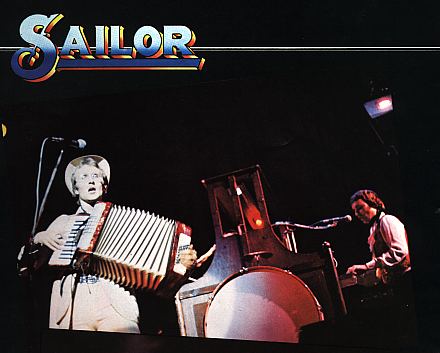
|
The new
Sailor LP is entitled |
